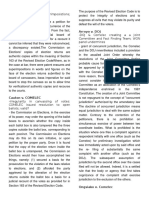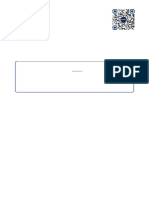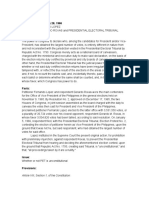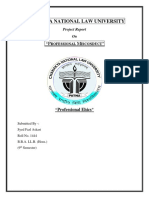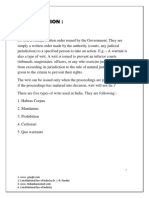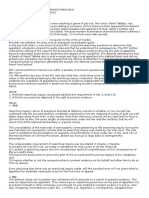Velez Vs Poe
Velez Vs Poe
Uploaded by
Gillian BrionesCopyright:
Available Formats
Velez Vs Poe
Velez Vs Poe
Uploaded by
Gillian BrionesOriginal Title
Copyright
Available Formats
Share this document
Did you find this document useful?
Is this content inappropriate?
Copyright:
Available Formats
Velez Vs Poe
Velez Vs Poe
Uploaded by
Gillian BrionesCopyright:
Available Formats
Issue: Whether or not the Court acquires jurisdiction over the case upon filing of the petition for
certiorari under Rule
64 in relation to Rule 65, No.
Ruling:
The Supreme Court ruled in the negative because of prematurity, there being no election protest in this case.
The Supreme Court held that, the case must be dismissed for lack of jurisdiction and prematurity, petitions in the
cases involved both having been directly elevated before the Supreme Court, in its capacity as the only tribunal to
resolve a presidential and vice presidential election contest under the Constitution. Evidently, the primary jurisdiction
of the Court can directly be invoked only after, not before, the elections are held.
In the case at bar, the petitioners invoked the provisions of Art VII, Section 4, Par. 7 of the 1987 Constitution, wherein
they assailed the jurisdiction of the COMELEC when it took cognizance of SPA No. 04-003 and thus urged the
Supreme Court to instead take on the petitions they directly instituted before it.
As provided for by the Constitution:
"The Supreme Court, sitting en banc, shall be the sole judge of all contests relating to the election, returns, and
qualifications of the President or Vice-President, and may promulgate its rules for the purpose."
The Supreme Court stated that the provision herein provided is an innovation of the 1987 Constitution. That the
omission in the 1935 and 1973 Constitution to designate any tribunal to be the sole judge of presidential and vice-
presidential contests, has constrained this Court to declare in Lopez vs. Roxas, as not being justiciable controversies
or disputes involving contests on the elections, returns and qualifications of the President or Vide President. Such
lapse prompted the Congress to create RA 1793, “An Act Constituting an Independent Presidential Electoral Tribunal
to Try, Hear and Decide Protests Contesting the Election of the President-Elect and Vice President Elect of the
Philippines and Providing for the Manner of Hearing the Same”. Such act designated the Chief Justice and the
Associate Justices os the Supreme Court to be the members of the tribunal.
However, the Supreme Court contemplated that, the characterization of “contest” is in reference to post-election
scenario. Election contests consists of either an election protest or a quo warranto which, although two distinct
remedies, would have one objective in view, to dislodge the winning candidate from office. Such is supported in the
premise, as provided for by the Rules of the Presidential Electoral Tribunal:
Rule 12. Jurisdiction. - The Tribunal shall be the sole judge of all contests relating to the election, returns, and
qualifications of the President or Vice-President of the Philippines.
"Rule 13. How Initiated. - An election contest is initiated by the filing of an election protest or a petition for quo
warranto against the President or Vice-President. An election protest shall not include a petition for quo warranto. A
petition for quo warranto shall not include an election protest.
"Rule 14. Election Protest. - Only the registered candidate for President or for Vice-President of the Philippines who
received the second or third highest number of votes may contest the election of the President or the Vice-President,
as the case may be, by filing a verified petition with the Clerk of the Presidential Electoral Tribunal within thirty (30)
days after the proclamation of the winner.
The rules categorically speak of the jurisdiction of the tribunal over contests relating to the election, returns and
qualifications of the "President" or "Vice-President", of the Philippines, and not of "candidates" for President or Vice-
President. A quo warranto proceeding is generally defined as being an action against a person who usurps, intrudes
into, or unlawfully holds or exercises a public office. In such context, the election contest can only contemplate a post-
election scenario. In Rule 14, only a registered candidate who would have received either the second or third highest
number of votes could file an election protest. This rule again presupposes a post-election scenario.
It is fair to conclude that the jurisdiction of the Supreme Court, defined by Section 4, paragraph 7, of the 1987
Constitution, would not include cases directly brought before it, questioning the qualifications of a candidate for the
presidency or vice-presidency before the elections are held.
You might also like
- 154 Rafael v. Embroidery and Apparel Control and Inspection BoardDocument3 pages154 Rafael v. Embroidery and Apparel Control and Inspection BoardTherese Espinosa100% (1)
- Nationalista Party VS de VeraDocument6 pagesNationalista Party VS de VeraandangNo ratings yet
- Macalintal Vs PET - DigestDocument2 pagesMacalintal Vs PET - DigestRosette G. ReynoNo ratings yet
- Consti Lopez vs. RoxasDocument2 pagesConsti Lopez vs. RoxasRaymond Ruther100% (1)
- I. JudiciaryDocument238 pagesI. Judiciaryshi10No ratings yet
- I1. Lopez vs. RoxasDocument2 pagesI1. Lopez vs. RoxasJohn Lester TanNo ratings yet
- Judicial Department Case DigestsDocument23 pagesJudicial Department Case DigestsJonathan Yulo isananNo ratings yet
- Lopez V RoxasDocument14 pagesLopez V RoxaspaokaeNo ratings yet
- Special Civil Actions Case Digest - Rule 66 and 67Document12 pagesSpecial Civil Actions Case Digest - Rule 66 and 67Arvin Antonio OrtizNo ratings yet
- Consti 4Document10 pagesConsti 4Jay Rome CastillanoNo ratings yet
- G.R. No. L-3474 December 7, 1949Document3 pagesG.R. No. L-3474 December 7, 1949Josie Jones BercesNo ratings yet
- Macalintal Vs Pet (2010) DigestDocument7 pagesMacalintal Vs Pet (2010) DigestKar EnNo ratings yet
- 471 RamosDocument3 pages471 Ramosmonica may ramosNo ratings yet
- Nacionalista Party vs. de VeraDocument9 pagesNacionalista Party vs. de VeradenvergamlosenNo ratings yet
- Lopez Vs Roxas - Full TextDocument7 pagesLopez Vs Roxas - Full TextDonnia MayeNo ratings yet
- Conditions For The Exercise of Judicial ReviewDocument317 pagesConditions For The Exercise of Judicial ReviewAudrey Kristina MaypaNo ratings yet
- Section 4. The President and The Vice-President Shall BeDocument3 pagesSection 4. The President and The Vice-President Shall BeKye GarciaNo ratings yet
- Manila Electric Company, Petitioner, vs. Pasay Transportation Company, Inc., Et Al.Document3 pagesManila Electric Company, Petitioner, vs. Pasay Transportation Company, Inc., Et Al.bukmarkNo ratings yet
- Election CasesDocument76 pagesElection CasesReymart ReguaNo ratings yet
- Article Vii. The Executive Department Section 1. Executive PowerDocument10 pagesArticle Vii. The Executive Department Section 1. Executive PowerRebecca TanNo ratings yet
- Lopez Vs RoxasDocument9 pagesLopez Vs RoxasEugene ValmonteNo ratings yet
- Macalintal v. PETDocument5 pagesMacalintal v. PETJazem AnsamaNo ratings yet
- Article Vii, Section 4 Cases-Case DigestDocument7 pagesArticle Vii, Section 4 Cases-Case DigestCamelle Gacusana MansanadeNo ratings yet
- Supreme Court: Vicente Francisco For Petitioner. Sycip and Salazar For RespondentsDocument10 pagesSupreme Court: Vicente Francisco For Petitioner. Sycip and Salazar For RespondentsMart Amiel LafortezaNo ratings yet
- Case Digests Executive, Judicial & National Economy and PatrimonyDocument61 pagesCase Digests Executive, Judicial & National Economy and PatrimonyMichelle VillarNo ratings yet
- 19 - 13 - Lopez vs. RoxasDocument13 pages19 - 13 - Lopez vs. RoxasWasabi FruinNo ratings yet
- 4ESRVVDocument7 pages4ESRVVXennia Keizia FernandezNo ratings yet
- 005 Lopez Vs Roxas 17 Scra 756 PrintedDocument6 pages005 Lopez Vs Roxas 17 Scra 756 Printedangelo6chingNo ratings yet
- Motion For ReconsiderationDocument6 pagesMotion For ReconsiderationElaine HonradeNo ratings yet
- Executive DigestsDocument31 pagesExecutive DigestsKristelle TNo ratings yet
- Lopez vs. Roxas, Et Al. 17 SCRA 756, July 28, 1966 PDFDocument6 pagesLopez vs. Roxas, Et Al. 17 SCRA 756, July 28, 1966 PDFFrancis OcadoNo ratings yet
- Module 3 ReviewerDocument49 pagesModule 3 ReviewerCyan ValderramaNo ratings yet
- Module 3 Reviewer I. Philippine Legal System A. Courts: Who Interprets and The Constitution and The Law?Document42 pagesModule 3 Reviewer I. Philippine Legal System A. Courts: Who Interprets and The Constitution and The Law?Cyan ValderramaNo ratings yet
- 9 Tecson v-3. ComelecDocument4 pages9 Tecson v-3. ComelecRaymond ChengNo ratings yet
- Purisima V SalangaDocument6 pagesPurisima V SalangaGen GrajoNo ratings yet
- Republic of The Philippines V. Maria Lourdes Sereno G.R. NO. 237428, 11 MAY 2018 Ponente: Associate Justice Noel TijamDocument4 pagesRepublic of The Philippines V. Maria Lourdes Sereno G.R. NO. 237428, 11 MAY 2018 Ponente: Associate Justice Noel TijamHi Law SchoolNo ratings yet
- 2 Semester, School Year 2020-2021: I. ComelecDocument7 pages2 Semester, School Year 2020-2021: I. ComelecDANICA FLORESNo ratings yet
- Javier Vs ComelecDocument4 pagesJavier Vs ComelecClea LagcoNo ratings yet
- Constitutional Law Executive DepartmentDocument58 pagesConstitutional Law Executive DepartmentMary Licel RegalaNo ratings yet
- Velasco VS ComelecDocument11 pagesVelasco VS ComelecJoseph Dimalanta DajayNo ratings yet
- GDocument7 pagesGSapphireNo ratings yet
- A.1. - Lopez v. Roxas, G.R. No. L-25716, 28 July 1966Document19 pagesA.1. - Lopez v. Roxas, G.R. No. L-25716, 28 July 1966Jeunice VillanuevaNo ratings yet
- AdminDocument13 pagesAdminJasmine TorioNo ratings yet
- City of Manila vs. Tan TeDocument4 pagesCity of Manila vs. Tan Teroilene checkNo ratings yet
- Summary of Updates - Pol.alobba3Document14 pagesSummary of Updates - Pol.alobba3Aizel BatocabeNo ratings yet
- Republic of The Philippines vs. Maria Lourdes P.A. Sereno G.R. No. 237428 June 19 2018Document4 pagesRepublic of The Philippines vs. Maria Lourdes P.A. Sereno G.R. No. 237428 June 19 2018Arianne AstilleroNo ratings yet
- Executive DepartmentDocument24 pagesExecutive DepartmentJonathan Yulo isananNo ratings yet
- XVII. Citizenship and SuffrageDocument188 pagesXVII. Citizenship and SuffrageAlvinson DayritNo ratings yet
- Case Digest in Re Sereno-Downloaded From DigestPHDocument7 pagesCase Digest in Re Sereno-Downloaded From DigestPHSema HvaNo ratings yet
- Lopez v. RoxasDocument3 pagesLopez v. RoxasmyschNo ratings yet
- Reyes v. HRETDocument32 pagesReyes v. HRETcitizenNo ratings yet
- Aquilino Q. Pimentel, Jr. Versus Joint Committee of Congress To Canvass The Votes For President & Vice President in The May 10 2004 ElectionsDocument49 pagesAquilino Q. Pimentel, Jr. Versus Joint Committee of Congress To Canvass The Votes For President & Vice President in The May 10 2004 ElectionsLex LimNo ratings yet
- Lopez Vs Roxas, 17 SCRA 756Document3 pagesLopez Vs Roxas, 17 SCRA 756Denee Vem MatorresNo ratings yet
- Macalintal Vs PETDocument4 pagesMacalintal Vs PETMarkNo ratings yet
- Legal Profession Art. Viii Judicial DepartmentDocument3 pagesLegal Profession Art. Viii Judicial DepartmentChris InocencioNo ratings yet
- Conflict of Laws CasesDocument75 pagesConflict of Laws CasesRitch LibonNo ratings yet
- Legal ResearchDocument5 pagesLegal ResearchJanileahJudetteInfante100% (1)
- Macalintal v. Presidential Electoral TribunalDocument14 pagesMacalintal v. Presidential Electoral TribunalAK100% (1)
- 20 Guerrero v. Comelec - 336 SCRA 458Document13 pages20 Guerrero v. Comelec - 336 SCRA 458Bee CGNo ratings yet
- Philippine Court SystemDocument4 pagesPhilippine Court Systemhasna.ansary.24No ratings yet
- Illegal Arrest Waived If Not Raised in Arraignment 1. People Vs Aminola 630 S 384Document5 pagesIllegal Arrest Waived If Not Raised in Arraignment 1. People Vs Aminola 630 S 384Gillian BrionesNo ratings yet
- What Is Searching Inquiry? 1. People vs. Dayot 187 S 637 2. People vs. Alicando, SupraDocument4 pagesWhat Is Searching Inquiry? 1. People vs. Dayot 187 S 637 2. People vs. Alicando, SupraGillian BrionesNo ratings yet
- Plea Must Be Unconditional 1. People vs. Patrick de Luna 174 S 204Document5 pagesPlea Must Be Unconditional 1. People vs. Patrick de Luna 174 S 204Gillian BrionesNo ratings yet
- Civil Procedure - Atty. Custodio AY 2018 - 2019 (1st Sem) Joan PernesDocument12 pagesCivil Procedure - Atty. Custodio AY 2018 - 2019 (1st Sem) Joan PernesGillian BrionesNo ratings yet
- Plea To A Lesser Offense 1. Gonzales III Vs Office of The President 679 S 614Document4 pagesPlea To A Lesser Offense 1. Gonzales III Vs Office of The President 679 S 614Gillian BrionesNo ratings yet
- PDF 54 RP V Gallo - Compress PDFDocument2 pagesPDF 54 RP V Gallo - Compress PDFGillian BrionesNo ratings yet
- Part 1 Final CompilationDocument291 pagesPart 1 Final CompilationGillian BrionesNo ratings yet
- Customs Taxation: Syllabus For Taxation II (SY 2015-2016) Atty. Jon LigonDocument2 pagesCustoms Taxation: Syllabus For Taxation II (SY 2015-2016) Atty. Jon LigonGillian BrionesNo ratings yet
- Special Procedure Judge Max de Leon: Special Proceedings GB Pg. 1Document3 pagesSpecial Procedure Judge Max de Leon: Special Proceedings GB Pg. 1Gillian BrionesNo ratings yet
- SpecPro Part 2Document2 pagesSpecPro Part 2Gillian BrionesNo ratings yet
- Judicial Action Tax + CasesDocument28 pagesJudicial Action Tax + CasesGillian BrionesNo ratings yet
- TML - fnt15Document14 pagesTML - fnt15Gillian BrionesNo ratings yet
- Tuan Mat Tuan Lonik v. PPDocument7 pagesTuan Mat Tuan Lonik v. PPFongVoonYukeNo ratings yet
- Issue 3Document2 pagesIssue 3Daniyal SirajNo ratings yet
- Petition For ReviewDocument5 pagesPetition For ReviewNadine AbenojaNo ratings yet
- First Cause of ActionDocument3 pagesFirst Cause of ActionFaith FernandezNo ratings yet
- Chanakya National Law University: Project Report OnDocument23 pagesChanakya National Law University: Project Report OnGauransh Mishra100% (1)
- Republic Act No. 10741 (Labor Code of The Philippines) 2016Document4 pagesRepublic Act No. 10741 (Labor Code of The Philippines) 2016John Edward Kenneth Macawili RagazaNo ratings yet
- Senate Filibuster LetterDocument5 pagesSenate Filibuster Letterpgattis7719No ratings yet
- F. Hoffmann-La Roche & Co. LTD Vs Geoffrey Manners & Co. PVTDocument4 pagesF. Hoffmann-La Roche & Co. LTD Vs Geoffrey Manners & Co. PVTPrincess aastiNo ratings yet
- Federalism in Malaysia Lec 1Document17 pagesFederalism in Malaysia Lec 1luluNo ratings yet
- Specific Performance of ContractsDocument58 pagesSpecific Performance of ContractsArun Shokeen71% (7)
- Correctional Administration QuestionsDocument16 pagesCorrectional Administration QuestionsTreb Medz100% (4)
- CH 3 Diokno On TrialDocument12 pagesCH 3 Diokno On TrialRAFAEL FRANCESCO SAAR GONZALESNo ratings yet
- Mutual Film Corporation v. Industrial Commission of Ohio 236 U.S. 230 February 23, 1915Document2 pagesMutual Film Corporation v. Industrial Commission of Ohio 236 U.S. 230 February 23, 1915Ayo LapidNo ratings yet
- Interpretation of StatutesDocument7 pagesInterpretation of StatutesFrancis ChikombolaNo ratings yet
- (D) "In Any Other Way Contributes" To The (Attempted) Commission ... "By A Group ... Acting With A Common Purpose"Document2 pages(D) "In Any Other Way Contributes" To The (Attempted) Commission ... "By A Group ... Acting With A Common Purpose"clandestine2684No ratings yet
- Fair Housing Council V Roommates - Com November 2008 Summary Judgment RulingDocument10 pagesFair Housing Council V Roommates - Com November 2008 Summary Judgment RulingEric GoldmanNo ratings yet
- Valencia V SandiganbayanDocument3 pagesValencia V SandiganbayanChaii CalaNo ratings yet
- ConstitutionDocument11 pagesConstitutionAmitesh TejaswiNo ratings yet
- Spec Pro CasesDocument489 pagesSpec Pro Casesdhimhi09No ratings yet
- PLD 2010 Lahore 413Document5 pagesPLD 2010 Lahore 413muhammad raiqNo ratings yet
- 20 MARK MONTELIBANO v. LINDA YAP PDFDocument12 pages20 MARK MONTELIBANO v. LINDA YAP PDFIldefonso HernaezNo ratings yet
- Tolentino p3Document2 pagesTolentino p3cmv mendozaNo ratings yet
- Ugalde V Ysasi (.)Document2 pagesUgalde V Ysasi (.)Jovi BigasNo ratings yet
- People OF THE Philippines, Plaintiff-Appellee, vs. ROMEO G. Jalosjos, Accused-AppellantDocument42 pagesPeople OF THE Philippines, Plaintiff-Appellee, vs. ROMEO G. Jalosjos, Accused-AppellantHemsley Battikin Gup-ayNo ratings yet
- Motion For Leave To File An Amended AnswerDocument12 pagesMotion For Leave To File An Amended AnswerColorblind JusticeNo ratings yet
- Alcantara Vs PonceDocument7 pagesAlcantara Vs PonceSachuzenNo ratings yet
- Rule 116 People V FranciscoDocument2 pagesRule 116 People V FranciscokdchengNo ratings yet
- Free Telephone Workers Union vs. Ministry of LaborDocument2 pagesFree Telephone Workers Union vs. Ministry of LaborJules BaldonNo ratings yet
- Estafa JurisprudenceDocument3 pagesEstafa JurisprudenceLaurice PocaisNo ratings yet


































